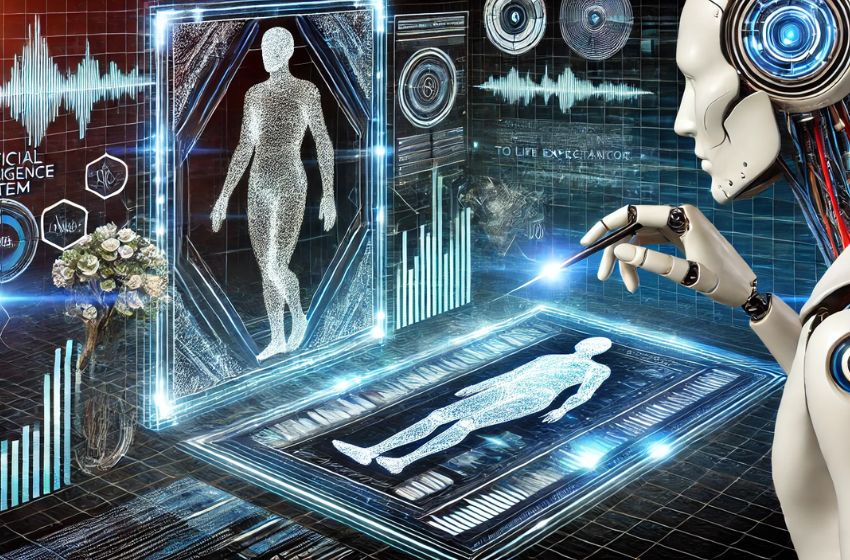The idea of predicting a person’s death has always intrigued people, whether through astrology, health calculators, or psychological profiling. With the advent of artificial intelligence (AI), this concept has taken a technological turn. The term “artificial intelligence death calculator” refers to the use of sophisticated algorithms and AI systems to estimate a person’s life expectancy or potential death date. This concept raises a mix of curiosity, ethical dilemmas, and scientific discussions in the modern era.
In this article, we’ll explore what an “artificial intelligence death calculator” is, how it functions, the factors it considers, and the broader implications for society. Welcome to Wisto Journal, where we delve into fascinating topics like this.
What Is an Artificial Intelligence Death Calculator?
An “artificial intelligence death calculator” is a tool or system designed to estimate a person’s lifespan based on various data inputs. These inputs may include medical history, lifestyle choices, genetics, environmental factors, and even psychological assessments. AI systems use complex algorithms to analyze this data and predict a person’s probable lifespan or estimate when their death might occur.
While the concept may seem futuristic or morbid, the core idea is rooted in predictive analytics—an AI’s ability to analyze massive amounts of data and draw logical conclusions. Many death calculators already exist in healthcare, where AI assesses risks and outcomes for diseases like cancer or heart disease. But an “artificial intelligence death calculator” can stretch beyond just disease prediction, entering a much wider realm of life expectancy predictions.
How Does the Artificial Intelligence Death Calculator Work?
An artificial intelligence death calculator works by using machine learning algorithms that are fed vast amounts of data. These algorithms can learn from previous cases and improve accuracy over time. Here’s how it generally works:
- Data Collection: First, the system collects relevant data about an individual. This includes medical records, family history, daily habits, and lifestyle factors such as diet and exercise.
- Data Processing: The AI processes this data through its algorithm, identifying patterns and trends that correlate with specific outcomes, including mortality risk.
- Predictive Analysis: After processing the data, the AI can offer a prediction based on probabilities. For example, it may calculate a percentage risk of dying from specific causes, or estimate a likely range for an individual’s remaining lifespan.
- Feedback and Refinement: The AI system refines its predictions by continuously learning from more data, making future predictions more accurate.
At Wisto Journal, we explore how cutting-edge AI systems like the artificial intelligence death calculator push boundaries in healthcare, predictive analysis, and human longevity.
Factors Considered in AI Death Calculators
An artificial intelligence death calculator relies on multiple factors to make its predictions. Some key considerations include:
1. Medical History
AI uses a person’s medical history, including past diseases, surgeries, and medications, to assess potential health risks. Chronic diseases, for instance, significantly affect life expectancy, and the AI uses this information to make informed predictions.
2. Lifestyle Factors
AI also evaluates lifestyle choices such as diet, smoking, alcohol consumption, and physical activity. These are major determinants of health and can play a crucial role in how long someone is likely to live.
3. Genetics
Family history and genetic predispositions to certain diseases are important in calculating death risks. AI systems can detect if an individual is genetically predisposed to ailments like heart disease or cancer, making their death calculator predictions more accurate.
4. Environmental Factors
Where someone lives, the air quality, pollution levels, and exposure to toxins can affect health and life expectancy. AI systems consider these environmental factors when making life predictions.
5. Psychological and Emotional Health
In some advanced systems, even psychological factors are included. Emotional health, stress levels, and mental well-being can influence life expectancy, which an AI death calculator may take into account.
Here at Wisto Journal, we are always keen to explore how data is transforming our understanding of the human body and mind.
Ethical Concerns About AI Death Calculators
As fascinating as the concept of an artificial intelligence death calculator is, it also raises serious ethical concerns. Should we use AI to predict something as delicate and personal as death? Here are some key ethical considerations:
1. Privacy Issues
One major concern is privacy. AI death calculators require vast amounts of personal data. This raises questions about how this data is stored, used, and shared. Can users trust that their data will remain secure?
2. Psychological Impact
The psychological impact of learning one’s predicted death date could be immense. Knowing such predictions might cause unnecessary anxiety or stress, affecting a person’s quality of life. The responsibility of delivering such information is also a significant ethical challenge.
3. Accuracy
While AI death calculators can be sophisticated, no algorithm is 100% accurate. Predicting death is inherently uncertain, and reliance on an artificial intelligence death calculator could lead to misguided decisions or undue worry.
4. Control Over Life and Death
Some argue that using AI to predict death gives a sense of control over an uncontrollable aspect of life. Does this create a false illusion of certainty? Philosophically, should we even attempt to predict death with technology?
At Wisto Journal, we believe in addressing these ethical concerns thoughtfully as we continue to navigate the era of artificial intelligence.
Potential Benefits of AI Death Calculators
On the flip side, artificial intelligence death calculators also have potential benefits that could positively impact society, healthcare, and personal decision-making.
1. Health Planning
If used correctly, these calculators can help people make better lifestyle choices. If someone learns that they have a higher risk of mortality due to poor health habits, they may be motivated to change their lifestyle for the better.
2. Preventive Healthcare
AI death calculators could enhance preventive healthcare by allowing doctors to intervene early. If the AI detects a high risk for a specific disease, healthcare providers can take preventive measures to reduce that risk.
3. Improved End-of-Life Planning
For individuals and families, having an idea of life expectancy could assist with financial planning, will creation, or even setting personal goals before the inevitable. Though death is a sensitive topic, planning ahead may offer peace of mind.
4. Scientific Advancements
The development of an artificial intelligence death calculator could lead to scientific advancements in understanding human aging and mortality. It could contribute valuable insights into the factors that influence lifespan and health.
Is the Future Ready for an AI Death Calculator?
As AI continues to advance, the idea of an “artificial intelligence death calculator” becomes increasingly realistic. Whether we will fully adopt such systems in everyday life remains uncertain. There are still many unanswered questions and ethical dilemmas surrounding these tools. However, with the right regulations, safeguards, and responsible use, AI death calculators could become valuable tools in healthcare and personal decision-making.
At Wisto Journal, we’ll continue to explore the ways AI is changing the world, and how emerging technologies like the artificial intelligence death calculator could reshape our understanding of life and death.
Conclusion
The artificial intelligence death calculator is a controversial yet fascinating development in the world of AI. By analyzing data from medical history, lifestyle choices, genetics, and even psychological health, AI can attempt to predict life expectancy. While it raises many ethical concerns, it also offers potential benefits, from better health planning to preventive care. Whether the future holds a place for such AI tools is still a question, but it’s a topic that continues to evolve.



